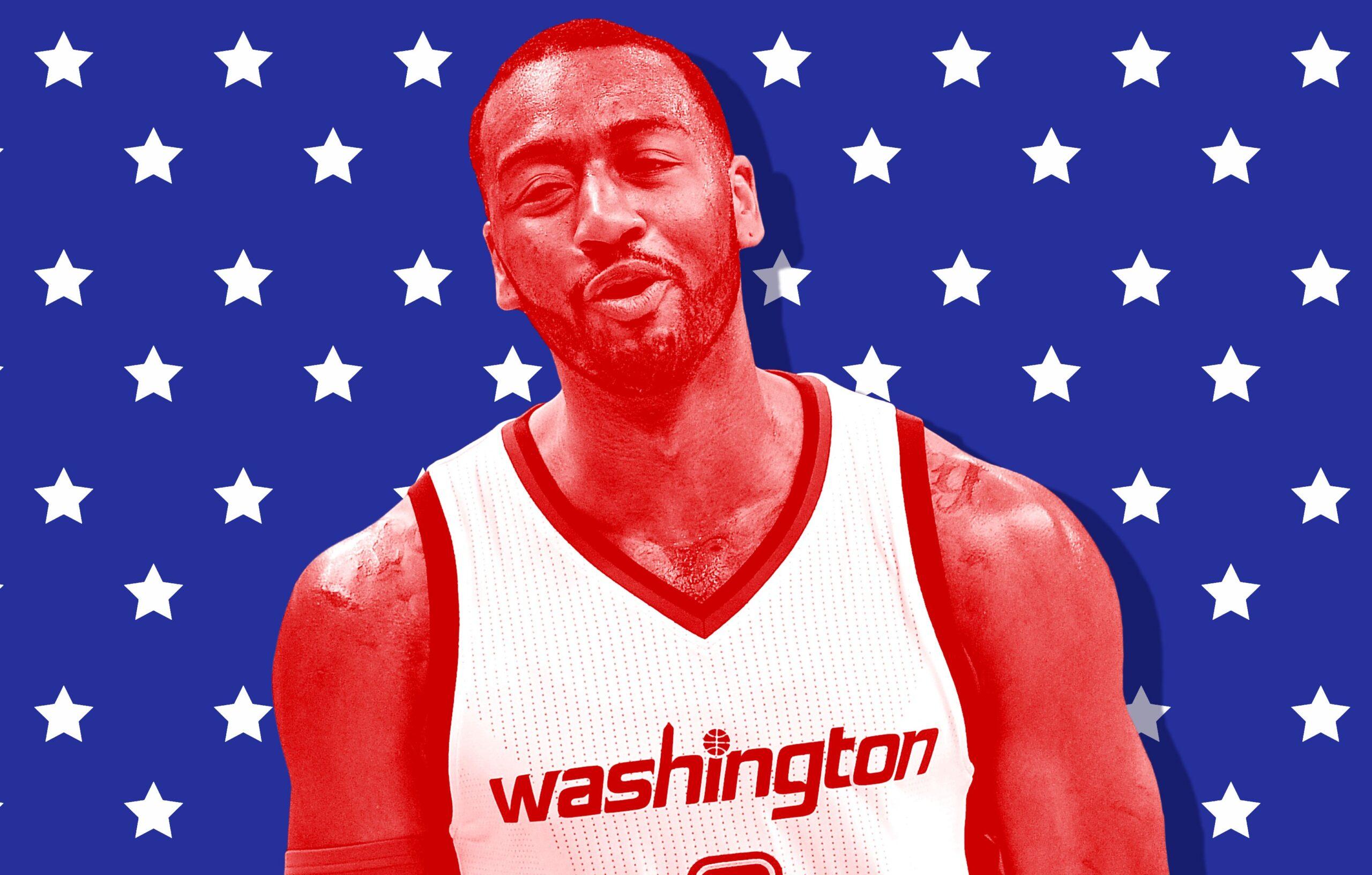These Playoffs Belong to John Wall
After years of being overlooked in favor of his contemporaries, the Wizards’ franchise player is in the midst of a postseason breakout. With the way the East has shaken out, Washington’s path to the conference finals is clear. Should he reach that point, there’s no telling how high his star could rise.
John Wall is one playoff run away from being a superstar. Since coming into the league seven years ago, Wall has gotten better every season, evolving from a player who relied primarily on his absurd athleticism to a well-rounded floor general who controls the game with his mind as much as his body. He has been an All-Star the last four seasons, but has remained relatively anonymous (he doesn’t even have a signature shoe deal) because the Wizards ironically lack a national profile. They have made the playoffs only twice in his time in Washington, and his last appearance in 2015 was cut short by a broken hand. This is his first season in the NBA when he has played with anywhere near as much talent as he did in college, when he teamed up with DeMarcus Cousins, Eric Bledsoe, and Patrick Patterson at Kentucky. With a supporting cast in place, and the Eastern Conference looking wide open, everything is set up for Wall to make the leap.
Wall has been as dominant as anyone in the playoffs so far. In the first two games of the Wizards’ first-round series with the Hawks, he is averaging 32 points on 47.7 percent shooting, 11.5 assists, and 4.5 rebounds a game, and he has been a star on both ends of the floor. He’s a 26-year-old entering the prime of his career, and he’s proving himself capable of carrying a team on his back. Whenever Atlanta has challenged Washington, Wall has provided an answer.
The Wizards trailed the Hawks 52–50 two minutes into the third quarter of Game 1 before Wall blew the game open, scoring or assisting on 24 of their next 31 points. When he was subbed out with just over a minute to go in the quarter, Washington was up 81–71, and the team never looked back, winning 114–107. In Game 2, the Wizards were down 87–86 with seven minutes left in the fourth quarter when Wall checked back in. He scored or assisted on 16 of their final 23 points to lead them to a 109–101 victory. Atlanta has the no. 4 defense in the NBA, and Synergy Sports rates Dennis Schröder as in the 90th percentile of isolation defenders in the league, yet Wall is making them look foolish. No player outside of Russell Westbrook can beat his defender in one step as easily as Wall can:
Wall has always been an exceptional athlete — he might be favored to win a decathlon among NBA players — but what has changed for him is how much he has refined his game. He is averaging career highs this season in field goal percentage (45.1 percent), free throw attempts (6.8), and assist-to-turnover ratio (2.61-to-1). For a long time, the scouting report on Wall was to go under every screen and dare him to shoot. Now that he can knock down open shots off the dribble, he is practically unguardable. There’s not much the defense can do when he’s making shots like this:
What separates Wall from Westbrook is mentality: Wall can get a shot off whenever he wants, but, in the vein of more traditional point guards, he always looks to pass first. If anything, the knock on Wall is that he isn’t aggressive enough. He averages six fewer field goal attempts per game than the MVP front-runner, and he hasn’t shown the ability to single-handedly drag an average team into the playoffs in the way Westbrook has this season. There’s some Ricky Rubio in his game in that he will pass up an open look in order to share the ball:
Maybe the most encouraging part of Wall’s playoff performance for Wizards fans is the take-no-prisoners attitude he is displaying. There is some lingering tension between him and Schröder from Washington’s loss to Atlanta in the second round of the 2015 playoffs, and he has gone out of his way to embarrass his counterpart in this series. Look at this sequence, where he intercepts a pass intended for Schröder, takes the ball the length of the court with Schröder on his trail, and dunks on him — then stares him down for five seconds. It’s a play Kawhi Leonard would make, except without an expression on his face.
What Wall has done to Schröder is just plain mean. The Hawks point guard has been a different player with Wall guarding him. He was 1-of-5 with Wall as his primary defender in Game 2, and 7-of-16 with anyone else. Only one of his five shots against Wall came inside the 3-point line. He’s a 34 percent 3-point shooter whose game is based on getting to the rim; if he’s settling for jumpers, it’s a big win for the defense. When he does go inside against Wall, he has to worry about plays like this chasedown block in transition. This is like an eagle tracking down a pigeon, which is roughly the size differential between the two:
At 6-foot-4 and 210 pounds with a 6-foot-9 wingspan, Wall has been blessed with elite size and speed for a point guard, and he’s one of the rare guys at his position who plays at a high level on both ends of the floor. Among the eight point guards in this year’s All-Star Game, Wall is the only one ranked in the top half of the league by Synergy Sports in defending isolations and pick-and-rolls. Just as important is the defensive versatility his size provides. He can comfortably guard any perimeter position, as well as switch screens and battle bigger players in the paint. Not many point guards can stay in front of Tim Hardaway Jr. (6-foot-6 and 205 pounds) and contest his shot like Wall does here:
Wall’s dominance of Atlanta has happened in relative obscurity, with Game 2 relegated to the NBA TV playoff ghetto, where Hawks games always seem to wind up. That has been the story for Washington all season: They have played on national TV far less often than most other playoff teams. They were one of only 12 teams scheduled for fewer than six games on ESPN, TNT, and ABC combined at the start of the season. Not much was expected of the Wizards after they missed the playoffs last season, and their slow start under new coach Scott Brooks had many calling for them to trade Wall and blow everything up. Instead, they have gone 49–25 since starting 2–8, a winning percentage that would have given them the fourth-best record in the league over the whole season.
Washington’s moment in the sun is coming. It was supposed to face the no. 1 seeded Celtics in the second round, a continuation of a rivalry that saw the Wizards dress up in all black before a game against the Celtics in January, but Boston is going back to Chicago with a 0–2 deficit in the first round. Even if the Celtics survive the Bulls, they don’t exactly look like a juggernaut. Chicago, meanwhile, has been one of the most inconsistent teams in the NBA this season, and the Bulls won’t be able to bully Washington like they have Boston in the first round. The Celtics are one of the smallest teams in the NBA; the Wizards are one of the biggest.
It’s always dangerous to look too far ahead in the postseason, but a hypothetical Eastern Conference finals matchup between Washington and Cleveland would be fascinating. The Wizards went 1–2 against the Cavs this season, but one of those losses happened when they were still finding themselves in early November, while the other came in a 140–135 OT thriller in February. Wall averaged 29.0 points, 8.7 assists, and 3.3 rebounds on 53.1 percent shooting in the three games between the two teams, and the Cavs have no one who can stay in front of him or challenge him when he gets to the rim. Neither team has played much defense over the past few months, so a series between them would likely turn into a fast-paced, crowd-pleasing shootout.
The matchups would be favorable for Washington. Kyrie Irving has been a bad defender his entire career, and there’s no one for him to guard in the Wizards lineup. The Cavs will try to keep him off Wall, but that means sticking him on either Bradley Beal or Otto Porter Jr. Kevin Love could be just as big a liability, since the Wizards can use either Marcin Gortat or Markieff Morris to screen for Wall, which would force one of the slowest big men in the NBA to try to stay in front of one of the fastest guards. LeBron James shut down Derrick Rose in the 2011 Eastern Conference finals, but that was a lifetime ago, and it’s hard to see a 32-year-old with as many miles on his body as LeBron being able to check Wall over the course of a seven-game series. Wall would see heavy doses of Iman Shumpert and J.R. Smith, which can’t inspire much confidence in Cavs fans.
Of course, Eastern Conference teams have had favorable matchups against LeBron before, and it hasn’t mattered. He has gone to the NBA Finals six straight times because he has an extra gear that no player across from him has been able to reach. When LeBron’s teams are pushed to the brink, he is almost always able to summon a superhuman performance. The last five NBA Finals MVPs were either LeBron or the player who guarded him. If Washington manages to make the Eastern Conference finals and knock off Cleveland, it will be because Wall matched LeBron bucket for bucket for two weeks with the entire basketball world watching. King James isn’t going to give up his crown willingly. Someone is going to have to take it from him. Wall has the pedigree to do it. Like LeBron, he was the no. 1 player in his high school class and the no. 1 pick in his draft. He has taken a long road to get to where he is today, but he is finally getting his chance on the big stage. John Wall’s time in the shadows is coming to an end.

